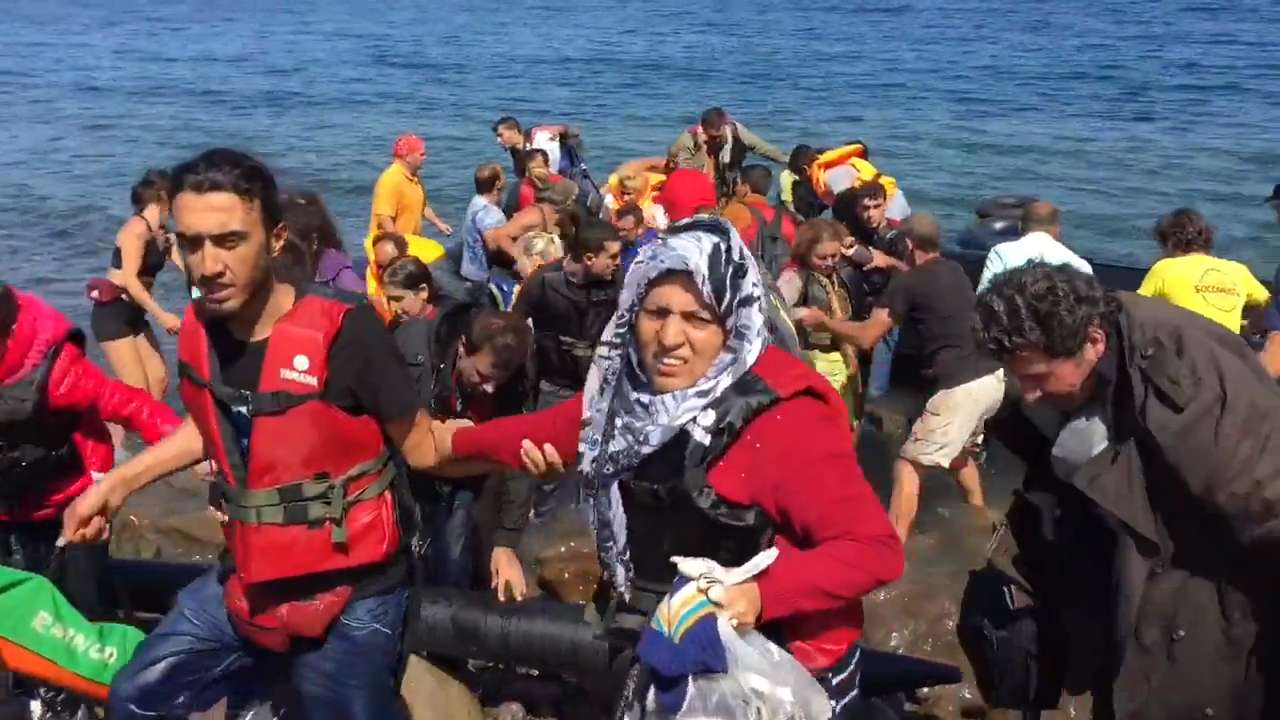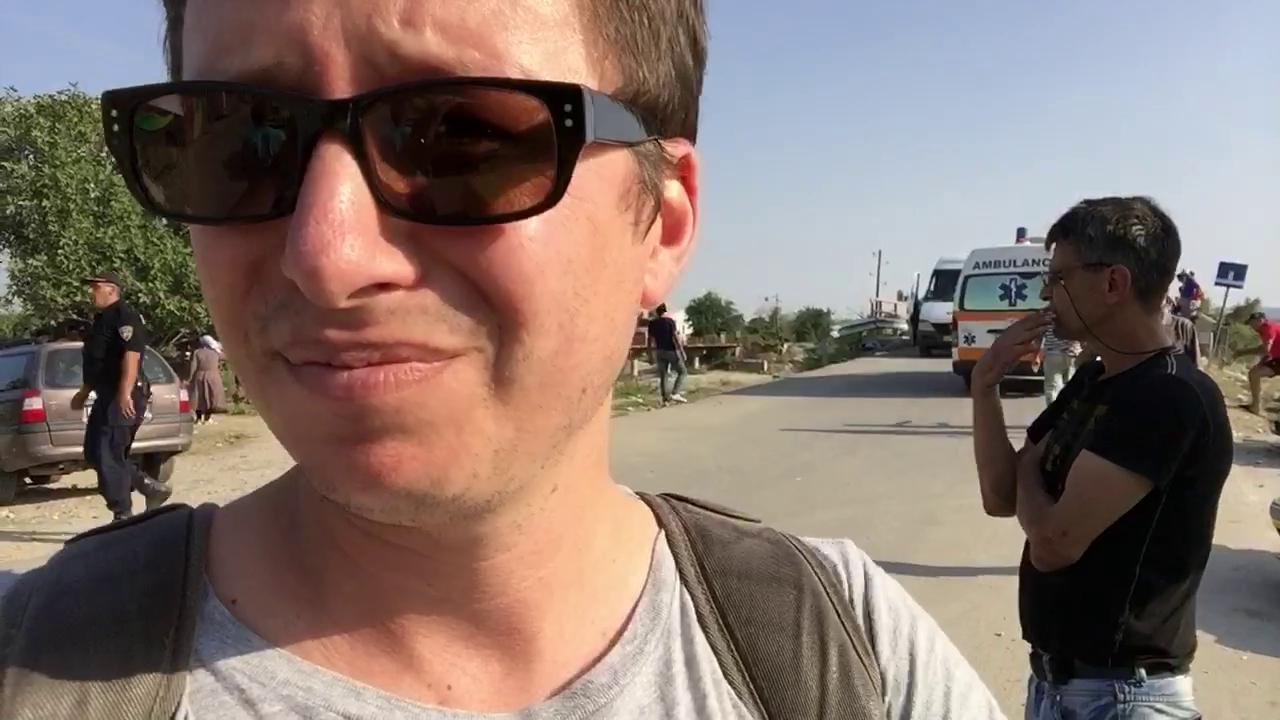Luke Skywalker
Super Moderator
{vb:raw ozzmodz_postquote}:
Over the coming week, USA TODAY reporter Kim Hjelmgaard will follow migrants as they make the arduous 1,500-mile journey from Greece's Lesbos island off the coast of Turkey to the German capital of Berlin. Here are his reports on the challenges facing both migrants and European authorities trying to cope with the biggest flood of refugees since World War II.
Follow along Kim Hjelmgaard's journey.
(Photo: James Sergent, USA TODAY)
11 p.m.
ATHENS — This is my first post in what will be a series of diary-form entries, stories, observations, interviews, audio, video, tweets and more that we will be running over the next 10 days or so as I make my way from Lesbos, Greece, back to Berlin. This is the route that hundreds of thousands of displaced migrants and refugees — many of them fleeing war and persecution in Syria and other conflict zones around the world — have been taking for months.
This page will serve as the landing spot for many of my thoughts and stories. You can also keep up with my journey on Facebook, Twitter and other social media spots. If you send me an email, I will do my best to reply.
USA TODAY
Why Europe's migrant crisis is surging now
6:30 a.m.
LESBOS, Greece — I arrived just before sunrise on this island about 6 miles off the coast of Turkey where 4,500 people a day have been washing up in life jackets and rubber dinghies. It's their first port of call on European territory as they go in search of a new life on a more peaceful continent. I'll be filing more from Lesbos later today, but wanted to drop some reflections on the picture of the crisis now.
Images define every conflict. They depict intense difficulty, tough decisions, suffering, confusion and more. Already, Europe's refugee and migrant crisis has yielded many.
The Turkish mainland is visible from Lesbos, Greece, as the sun rises on Sept. 19, 2015.
(Photo: Kim Hjelmgaard, USA TODAY)
There was Laith Majid, the weeping Iraqi father who almost drowned with his wife and children on the way to the Greek island Kos. (Majid and his family are now safe in Berlin.)
We recoiled at the delicate, lifeless body of Aylan Kurdi, the drowned Syrian child whose body washed up on a beach in Turkey. For many, Kurdi gave a face and a name to the unfolding humanitarian tragedy.
Back in April, an off-duty Greek military officer singlehandedly saved 20 migrants whose ship was breaking up off the coast of Rhodes, Greece. Sgt. Antonis Deligiorgis was a hero that day even if the awkwardly framed photos of his actions didn't fully capture it.
But to Deligiorgis' moral zenith we have also witnessed Petra Laszlo's ethical nadir. The Hungarian journalist was caught on video sticking her leg out to trip and kick people fleeing authorities.
For me, the picture that caught my attention more than any other was taken by Andrew Byrne, a Financial Times journalist.
It shows a group of about a dozen young Syrian refugees sitting cross-legged on the floor absolutely beaming with pleasure as they watch Tom and Jerry cartoons outside Budapest's main train station in Hungary. Volunteers had set up the cartoon on a projector, perhaps sensing that these children needed to be children again.
It's a simple, domestic snapshot that many of us who are parents can relate to. Byrne probably took it on his phone.
In those faces there is exuberance and joy, mixed with the misery of dislocation and terror as well as some boredom held briefly at bay. When I think of the migrant crisis I often think of this photo because of the drama it shows. It's neither tragedy nor comedy but something else.
Migrants and refugees arrive at the railway station in Szentgotthard, Hungary, near the Austrian border, on Sept. 19, 2015.
(Photo: Gyorgy Varga, AP)
1:30 p.m.
LESBOS, Greece — "Mamma, mamma, younan!"
Two sisters, in their early 20s at most, borrowed my phone and shouted into it. Their giddy voices were filled with a mixture of happiness, excitement and fear.
"Greece!" they told their mother waiting nervously back home in Syria. "We made it to Greece!"
Then they abruptly hung up and vanished into a throng of new arrivals, joining the several thousand dislocated, persecuted and impoverished migrants who landed on beaches here Saturday and were marching off to an unknown future.
Moments earlier, the sisters had half-crashed ashore this Greek island in a mostly deflated dinghy after setting off from Turkey.
There was a boy with them, too. He smiled. Safe for now.
On the way down to the beach, from high up on Lesbos' parched, olive-tree-rich hills, I could see the boats dotting the horizon like a small disorderly pearl necklace, only deep orange instead of white.
Lifejackets.
[h=2]UP NEXT[/h][h=2]03[/h]
Thousands of refugees and migrants are landing on the Greek island of Lesbos each day. USA Today reporter Kim Hjelmgaard witnessed some of them.
The Aegean Sea was merciful on this specific patch of coastline Saturday afternoon. Earlier in the day, a 5-year-old girl drowned. Fourteen others on her sunken boat were missing.
But even on a calm day, there was real terror on display. The angular cries of toddlers and elderly women rose above the din of the lapping waves. The men cried more.
Greece's highly fragrant wild pine trees bore no aromatherapeutic remedy.
The sisters' phone hadn't survived the 6-mile crossing from Turkey's western coast. But after confirming to their mother they were alive, they did not linger, keen to push on toward a new life somewhere in Europe. Germany or Sweden, perhaps — anywhere but war-torn Syria.
To get there, the migrants who land here must walk a winding, scorched road with no shade for 40 miles to Lesbos' port. Eventually, they take a Greek government-sponsored ferry to the mainland.
Dirty, wet and tired, the sisters readily accept such an undignified entrance to this region that doesn't know what to do with them.
But not everyone was coping.
One husband thought his wife was dying as she lay exhausted in a chair, her knuckles scraping the ground. Her eyes had that slow-roll look.
I pressed on.
Then, out of the blue, my phone rang. It was a third sister. She wanted to know if her siblings were OK.
This sister wouldn't say where she was from or where she was, but she shared her siblings' names then quickly hung up: Enas and Ranya.
The boy was called Ayad.
2 p.m.
THESSALONIKI, Greece —<span style="color: Red;">*</span>USA TODAY has been reporting on Europe's migrant and refugee crisis for months. We have done big-picture policy stories that look at the political arguments, sobering accounts of the steadily rising death toll (at sea and on land) and also more intimate items from the ground that (we hope)<span style="color: Red;">*</span>have provided some insight,<span style="color: Red;">*</span>specifically<span style="color: Red;">*</span>about the people we are talking about.
Refugees and migrants raise their hands in order to be allowed by the Macedonian police to cross the border from the northern Greek village of Idomeni to southern Macedonia, on Sept. 20, 2015.
(Photo: Giannis Papanikos, AP)
And they are all different people, a point easily lost in our various heated debate chambers — individuals from Syria, Iraq, Afghanistan, Eritrea, Gambia and Pakistan.
Many are even from within touching distance of the Europe's broader community: Serbs, Albanians, Moldovans. I've met Russians, Ukrainians and Egyptians. Over the last 24 hours, I've passed by hundreds of people on the road bearing the unmistakeable influence of the Asian Steppe.
Later this month, we expect to publish a special report that examines<span style="color: Red;">*</span>the migration crisis from a global perspective.
Europe is undoubtedly the<span style="color: Red;">*</span>story of the moment, but people across our planet are on the move like never before. They're leaving their homelands<span style="color: Red;">*</span>for all kinds of reasons ranging from war and political conflict to economic hopelessness.
I encourage you to look out for it.
I am still in the infancy of my journey back to Germany. Later today, I will cross into the Former Yugoslavian Republic of Macedonia. But already it's been fascinating to witness firsthand a rolling wave of mass movement that appears to have no foreseeable end.
That unwieldy trajectory<span style="color: Red;">*</span>—<span style="color: Red;">*</span>gravity-like, from relative darkness to relative light<span style="color: Red;">*</span>— is<span style="color: Red;">*</span>not particularly new or novel.
10:30 p.m.<span style="color: Red;">*</span>
GEVGELIJA, Macedonia —<span style="color: Red;">*</span>"Two-by-two, two-by-two," the police guard, a sturdily built disciplinarian, shouted.
Then: "Run, run, run."
The military-school method seemed a bit unnecessary. The migrants and refugees standing in an orderly line on the other side of the UNHCR (United Nations High Commissioner for Refugees) transit camp weren't behaving like naughty recruits or bickering schoolchildren.
They wanted a meal, a few supplies and a seat on a waiting train that would whisk them north to Tabanovce, a village less than a half-mile from Serbia.
Most said nothing. A few, allowed over the camp's threshold after several hours of waiting, playfully skipped or shared a joke.
Gevgelija, the Turkish name of this border town with Greece ordinarily known for its gambling dens and tourist trade, is a welcoming word that means "come again."
There was some of that sense of solidarity Sunday for the up to 7,000 people who, after entering the camp, were herded onto the train by Macedonian security personnel.
Jasmin Redzepi, who runs Legis, an aid group that supports migrants passing through Macedonia, said many of the people who travel through here just want to be treated with dignity.
"They have stories they want to tell<span style="color: Red;">*</span>and to be heard, not only want to be fed," he said.
I spent about an hour with Redzepi. His phone never stopped ringing and he never stopped answering.
[h=2]UP NEXT[/h][h=2]03[/h]
USA TODAY journalist Kim Hjelmgaard reports from the migrants trail in Macedonia. Kim Hjelmgaard, USA TODAY
Powered By WizardRSS.com | Full Text RSS Feed
